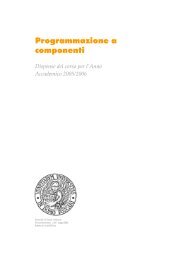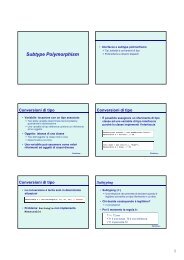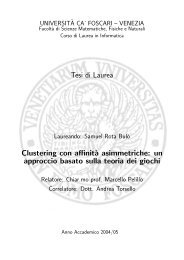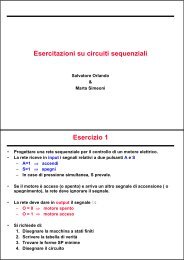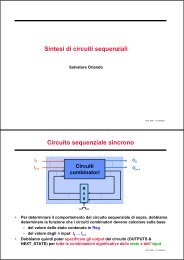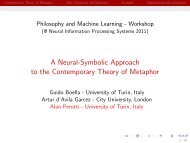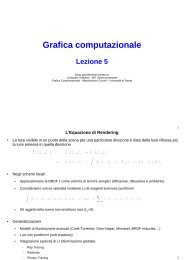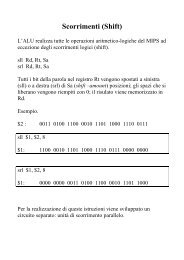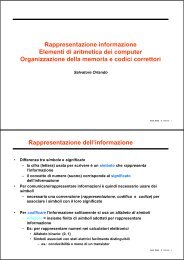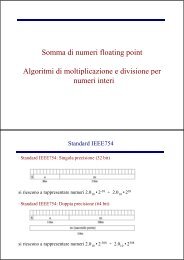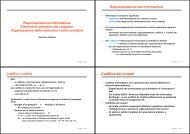Foscari - Dipartimento di Scienze Ambientali, Informatica e Statistica
Foscari - Dipartimento di Scienze Ambientali, Informatica e Statistica
Foscari - Dipartimento di Scienze Ambientali, Informatica e Statistica
You also want an ePaper? Increase the reach of your titles
YUMPU automatically turns print PDFs into web optimized ePapers that Google loves.
1 'Could I speak to Mr Yo, please?' 'Yes of course, I (fetch him)<br />
2 I'm afraid I can't come to the office <strong>di</strong>nner next week because I... (go on holiday)<br />
3 We've finally made a decision about the product launch. We ... (go ahead May)<br />
4 'We're running out of envelopes.' 'I (order more)<br />
5 'The photocopier doesn't work.' 'OK.I (call technician)<br />
6 He's resigned from the company and he ... (take job in New York)<br />
C Underline the correct form on the basis of the comment in brackets below.<br />
1 We will sell / are selling the company. (We've found a buyer.)<br />
2 I will meet / am meeting Jo at the airport. (Jo knows about this arrangement.)<br />
3 I will help / am helping her. (I've just decided.)<br />
4 Shares in BMX will / are going to fall. (I have some inside information.)<br />
5 Jo is going to teach / is teaching me Chinese. (Our lessons have already begun.)<br />
5 The gerund and the infinitive after verbs<br />
There are some verbs which are always followed by the gerund or ing form, and others which are<br />
followed by the infinitive with to.<br />
There are some rules that can help you work out these verb patterns.<br />
1 The gerund<br />
We use the ing form:<br />
a after verbs and expressions of emotional attitude towards something, e.g like, love, <strong>di</strong>slike,<br />
enjoy, hate, stand, mind.<br />
Working Americans enjoy spen<strong>di</strong>ng time with their families.<br />
b after certain other verbs, e.g. risk, avoid, spend time.<br />
I don't want to risk losing their custom.<br />
c when the activity is the subject or object of a sentence.<br />
Using a computer all day can be bad far your back.<br />
We don't encourage drinking on the premises.<br />
d after verbs that express ideas or advice, e.g. recommend, propose, suggest.<br />
Health experts recommend taking much longer lunch breaks.<br />
(Also The experts recommend that we take longer breaks.)<br />
e We also use the gerund imme<strong>di</strong>ately after prepositions e.g. before, after, since, by, about,<br />
on, for, in, to.<br />
An MP3 is generally used for listening to music. Before using it you need to attach the<br />
headphones.<br />
I look forward to hearing from you.<br />
2 The infinitive<br />
We use the infinitive:<br />
a after verbs that focus on a purpose or objective e.g. would like, want, plan, promise, decide,<br />
hope. We would like to inform you that we have decided to accept your proposal<br />
b after verbs that tell someone what they can do or what we want them to do, e.g. allow, ask,<br />
89



